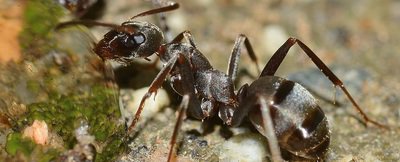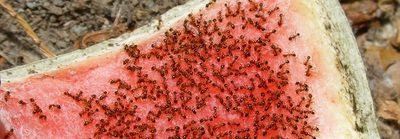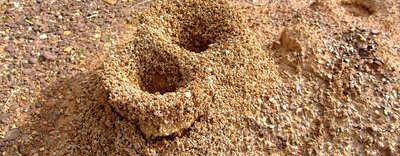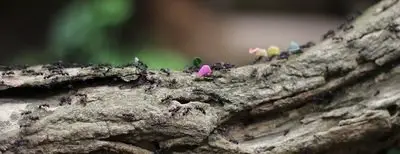
Keeping ants out of your campsite presents its own set of challenges when camping. When this happened to me, I had to learn the ins and outs of how to keep ants out of my campsite and tent. I am now going to pass on what I know to you.
So how do you keep ants out of your campsite and tent?
The best way to keep ants out of your campsite is, Keep your food secured, clean up after cooking or eating, do not leave drinks around the campsite or in your tent, especially if they are sugary, like soda, keep sweet-smelling scents to a minimum. This will help prevent ants from coming into your campsite. Using Diatomaceous Earth in a ring around your campsite will help repel ants. It is also a good idea to do this around your tent too.
To understand how to get rid of or avoid ants in your campsite, you first have to understand what attracts them. Let’s face ants are everywhere, but they only have one thing on their mind, and that is to feed their colony. They are especially attracted to for or drink high in sugar. This means those soda cans shouldn’t be left out or you will get a swarm of ants.
Don’t leave yet, we have more for you, including tips and other methods that work for keeping that little creepy crawlies away.
If you would like some great tips on keeping warm in your tent, after you read this article come back and check out this one- Keeping Warm In A Tent ( What really works )

Clickable Table Of Contents
Don’t attract Ants By Securely Storing Food
There are a lot of ways to effectively store your food while camping. You might have seen pictures of people stringing food up in a tree to keep it safe from bears. But you don’t have to go to that extreme!
If you just want to keep ants out, all you have to do is keep the food in a container with a tight lid. Also, try not to let anything drip down the side, or it will attract ants, especially anything sticky and sweet.
There’s no need to go extreme and get a bear canister which is a heavy-duty plastic container that bears can’t open. If you have a cooler, you can keep your food in there, and ants should leave it alone. Also, make sure to clean your utensils and dishes after using them.
Some campgrounds do provide on-site metal food lockers where you can store your food and any other items like toiletries that may attract insects or animals. Because you’ll be sharing this space with other campers, only put the most important items in there since there may not be space for all your things.
Also, try not to leave food unattended outside your tent or in the campground or picnic area. Birds or other animals can quickly steal pieces of food and may leave behind crumbs that will attract ants
- Food Storage Options
As mentioned, a cooler may be enough to repel ants and nothing more will be needed unless you are in bear country. One popular option among campers is to bring along a designated plastic tub that all food is stored in. Any non-perishable items can be stored together easily in a single 10-gallon tub.
Ziplock bags are also one of the most common and easiest to find ways of storing food while camping. Whether it’s putting snacks into them and then storing them in your plastic tote or taking them in your backpack while on the trails.
Tupperware containers are also lightweight and seal to protect any food. Another option is Nalgene jars which may be even more lightweight and are very secure. An added benefit is that all your food will stay fresh and you won’t have to worry about running out of food and spoiling your camping trip.

Don’t Feed The Ants – Dispose of Food and Trash Properly
You don’t just have to worry about storing your leftover food, but also about disposing of food and trash. Many campers use paper plates and napkins with plastic cutlery. If you don’t throw it away in a secure location, this could also attract ants.
Make sure all your trash is secured, either in a plastic bag or a bin if you have an RV. When you throw it away, put it in the designated area of your campsite. Some campsites may have special containers that are bear-proof and should be used at all times.
If you are camping in the backcountry, you may have to pack your trash out with you. In that case, ziplock bags can be helpful for storing garbage until your trip is over. Double bag everything just to make sure since you may have to leave the trash in your tent until you leave.
Avoiding Ants While RV Camping
If you brought your car or are glamping in an RV, food storage should be a breeze. You’ll then only have to worry about ants outside near your picnic table or campfire.
In that case, make sure to put down a tablecloth on the picnic table and wipe it clean when you finish eating. Make sure to dump any crumbs far away from your campsite.
If you didn’t bring a tablecloth, you can also use newspaper, a sheet or blanket, or even a waterproof map that could be easily wiped off. Again, just make sure to shake out any towels or blankets and dispose of paper far from your campsite.
Before you go to sleep, do a quick check around the ground. If you have kids or pets, they might have wandered off with a snack and left some crumbs. Just sweep them away or cover them with some dirt, so no ants show up overnight.
Keeping Ants Out of Your Tent
If you have a tent, you might have ants nearby trying to get in for many reasons, whether they smell food or just want a warm place for the night. There are several at home remedies for keeping ants away.
Some common ant repellents that you might have on hand include:
cucumber slices
spices and herbs (e.g., cinnamon, black pepper, cayenne, chili powder)
vinegar
coffee grounds
lemon juice
cornmeal
baby powder
If you’re camping without cooking and don’t have any of those on hand, you can use bug spray on the ground around the tent. Just make sure not to spray the tent directly or inside the tent because this could damage your tent.
Quick tip – You can repurpose the ashes from your campfire to repel ants. Simply collect the ashes and make a solid ring around your tent, picnic table or any other area you want to keep ants out of.
Use Diatomaceous Earth To Get Rid Of Ants
You may have heard that a common, natural insect repellent is diatomaceous earth. But what is it exactly and how does it work? Also, is it safe to use?
Diatomaceous earth is a naturally occurring rock that has a lot of silica and crumbles into a fine powder. According to a website on the topic, “at the microscopic live, diatomaceous earth is sharp and porous, making it highly absorbent.” Then, when insects walk through it, “it sticks to them and sucks vital moisture away from their exoskeletons,” causing them to die of dehydration. (source)
Because it is non-toxic, it is safe for humans and doesn’t damage the environment. It will work as long as it stays dry and, if it does get wet, all you have to do is re-apply it.

Don’t set up on their home
Not setting your campsite on or near ant mounds is always a best practice but if you are camping in a designated space, there may not be enough room to avoid this.
The solution is to get rid of the ants from the beginning. You can do this by bringing in commercial chemicals but not only may these be detrimental to the environment but you probably don’t want pesticides around your campsite.
A great way to deal with this problem quickly is to bring a pot of water to a boil and basically cook the ants instantly. It’s best to do this at dusk or during colder parts of the day when the ants are not as active. Also, you will want to come up to the mound slowly so that the ants do not get disturbed and remain in the nest.
The great part about this method is that even if it doesn’t kill all the ants, they will relocate their mound to protect the queen.
Don’t Attract Ant, Keep Scents to a Minimum
Although you probably won’t bring a lot of sweet-smelling things with you like cologne or perfume while camping, you still have to be careful of scent that might attract bugs. This includes some deodorants, toothpaste, and even soaps or body wash which make you smell sweeter.
Instead, swap it out for a simple, scent-free alternative. Also, make sure to store all your toiletries somewhere secure so it won’t spill or break, causing the scent to attract ants to your camp while you’re not there.

Disrupt Scent Trails Of Scout Ants
If a scout ant finds food at your campsite, you can be sure that you will soon have an infestation. It is vital to destroy the scent trail left behind in order to keep ants from swarming your site.
First, you will have to identify the scent trail. The only way to do this by eye is once the ants are starting to come to your site. Have you ever notice that ants usually follow in a single line? They are following the scent trail, and this is how you know where it is.
Next, you will need to disrupt the trail. There are few items that you might have on hand or should keep on hand when camping to get rid of the scent trail.
- Vinegar- Mix vinegar in a 1 cup vinegar to 3 cups water ratio. Spray or pour the solution along the scent trail.
- Chili powder- Chili powder doesn’t actually get rid of the trail, but since ants can’t stand the smell of chili powder they will be repelled by it.
- Cinnamon- There are a lot of people that say ground cinnamon works but the truth is it has to be concentrated to do the job. Concentrated oils are really what you need for this to work.
Even if there’s no trail of ants to visibly show the scent trail, just knowing that one exists will give you an advantage. If that’s the case, just make sure to clean around the entire area where the infestation happened, and you’ll be sure to disrupt the trail no matter where it was.
Products to Repel Ants
If you camp in an area where ants are a problem, there are several products you can buy and add to your packing list to deal with ants. However, not all may be necessary, and some could kill off the ant population which might be problematic depending on where you’re camping.
1. Raid Ant Baits: You can buy these small traps which have poisonous food inside them. The ants will eat the food, then take it back to their colony where they will feed it to the other ants, causing them to die. This is not ideal if you are camping near an anthill or large area of ants because they may be vital to that ecosystem. Also, this method takes a long time to work.
2. Ant Killer Spray: The brand EcoRaider sells a non-toxic liquid that will kill ants on contact. It is said to be both pet and child-friendly with a citrusy scent that will quickly dissipate. They also claim it will disrupt the scent trails for up to 4 weeks. Although it will kill the ants directly, it should only kill those it touches and won’t be transferred to the entire colony.
3. Raid Max Ant & Roach Spray: A cheaper alternative is a Raid spray that also kills ants on contact. It also claims it will continue to die for up to 6 months. You could also spray this down even if ants are not yet present as a deterrent. However, it may not smell nice and could be harmful to children, pets, and the environment so check before using.
All in all, it’s relatively simple to avoid having ants in your campsite. You’ll just need to be prepared and have a good offense. But, if something does go wrong, at least you’ll be prepared with ways to combat ants, so your trip isn’t ruined. I hope you found these tips useful and have a wonderful camping trip!
Dealing with an Ant Infestation
If ants do somehow invade your camp and get into your food, it’s best just to get rid of all the affected food. Again, make sure to dispose of it properly so it won’t attract more ants by wrapping it up well and throwing it away in a designated area.
Because the ants will have already found their way to your camp, chances are they have already laid down a scent trail to show the other ants how to get back to the food. The most important thing is to disrupt this scent trail to prevent any more ants from coming.
The truth about keeping ants out of your campsite
When you are in the great outdoors ants are everywhere and completely keeping them out of a campsite can be extremely challenging. The truth is, even with chemicals and tricks, scout ants will most likely make it into your site.
Most of us can live with one or two ants, but the only way to prevent an infestation is to make sure you store food properly and don’t have any food sources around to cause a mass invasion.
Have more solutions that work? We would love to hear about them, and we may add them to this article. Simply leave us a comment with your method.
More articles you will want to read.
Can Bears Smell Through Cans?
How to store food in bear country.
Tabletop camping stove (Best, Advantages, Types, Care)
How to keep insects out of your tent.

